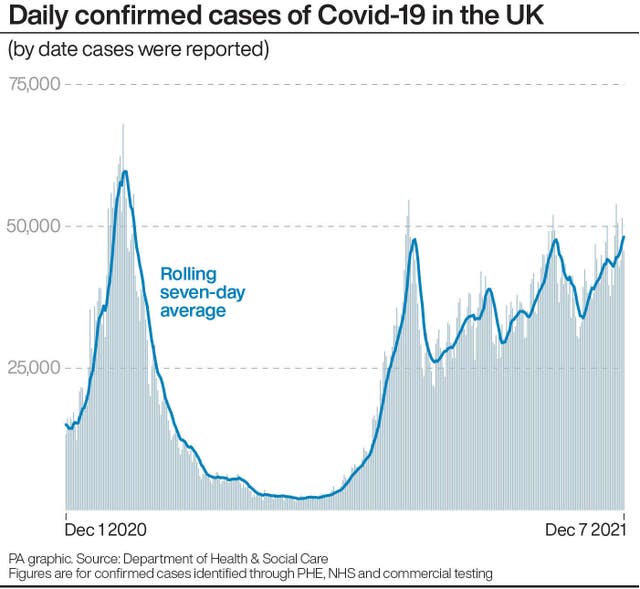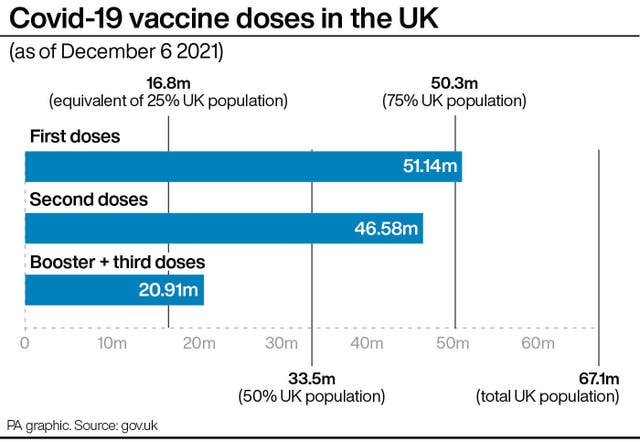Covid-19: NHS cannot demand lockdowns at ‘first whiff of extra pressure’
NHS Providers warned that a lack of staff is now the biggest problem facing trusts as they head into a challenging winter.

The NHS cannot demand “tough and long-lasting lockdowns” at the “first whiff of extra pressure” from Covid, the head of NHS Providers has said.
Chris Hopson, who is chief executive of the body representing NHS trusts, said the success of the vaccine rollout had changed the context of the pandemic.
It comes as the body warned that a lack of staff is now the biggest problem facing trusts as they head into a challenging winter.
This includes difficulties in recruitment, with nearly 100,000 NHS vacancies, and the loss of key staff to other sectors including retail and hospitality that pay better for some roles.
Mr Hopson said: “NHS Providers has always taken the view that, on public Covid infection control measures, the NHS doesn’t have all of the information and evidence needed to balance the health factors with the economic and social factors. Only the Government can make those decisions.

“All of us in the NHS recognise that we can’t be in a position where, at the first whiff of extra pressure, the NHS appears to be demanding that the nation goes back to very extensive, tough and long-lasting lockdowns.
“We recognise that vaccines, assuming their continued efficacy, have completely changed the overall context.
“Over time we all, the NHS included, will need to move from a Covid pandemic to a state where the virus is endemic.
“NHS leaders do believe, though, that the Government hasn’t been clear or effective enough in its public health messaging.
“We need to hear more frequently and more clearly that even if you have been vaccinated, you still risk catching Covid-19 and passing it on to others.
“We all therefore need to be very cautious about our personal behaviour, particularly when mixing inside with others we don’t live with.”
NHS Providers said the issues facing social care and the NHS were made worse by people leaving for jobs in retail and pubs and restaurants, where they can earn bonuses and higher wages overall.
In said an estimated 50,000 to 70,000 social care staff (about 3% to 4% of the workforce) have left in the last six months.
The organisation also pointed to growing numbers of health and care staff choosing to retire early or return to their countries of origin, alongside concerns that the current level of pressure will be “normalised”.
NHS trust leaders report “very worrying” retention problems amongst staff, including at a senior level, who have a greater level of discretion on whether they continue working for the health service, it said.
Other issues affecting the workforce include growing levels of staff sickness, including due to burnout.
There is also “increasing difficulty” in securing staff to work bank and agency shifts on which the NHS has become “worryingly reliant”, leading to the need to pay higher shift rates.
Mr Hopson said: “The single biggest message we are hearing from NHS staff is that they want the Government to acknowledge the scale of workforce problems and to show how this level of pressure on them will not become the new normal.
“Staff have been working flat out since before Covid-19 and we are asking them, once more, to ‘make an extraordinary effort this winter’.
“Staff will, of course, provide that extra effort. But they need to see a clear plan for how they get to a reasonable workload on a sustainable basis.
“The scale of the NHS’s workforce problems are plain for all to see. Nearly 100,000 NHS staff vacancies. Six billion pounds of annual spend on temporary staff to fill these gaps, 55% of staff working unpaid extra hours each week, 44% saying they’ve felt ill with work-related stress in the last year.

“All that frontline staff currently hear from Government is constant repetition of the fact that there are record numbers of doctors and nurses in the NHS and that current pressures are sustainable.”
Mr Hopson said the “extraordinary effort” from NHS frontline staff means the health service “won’t break or fall over this winter”.
But he said any growth in the NHS workforce has consistently failed to keep up with rising demand for care, adding: “This level of pressure on our workforce is totally unsustainable and it cannot go on much longer.
“It’s now risking patient safety, quality of care and staff health and wellbeing.”
Mr Hopson said NHS trusts were also concerned that mandatory vaccines for staff could lead to more workers leaving, thereby compromising patient safety.





